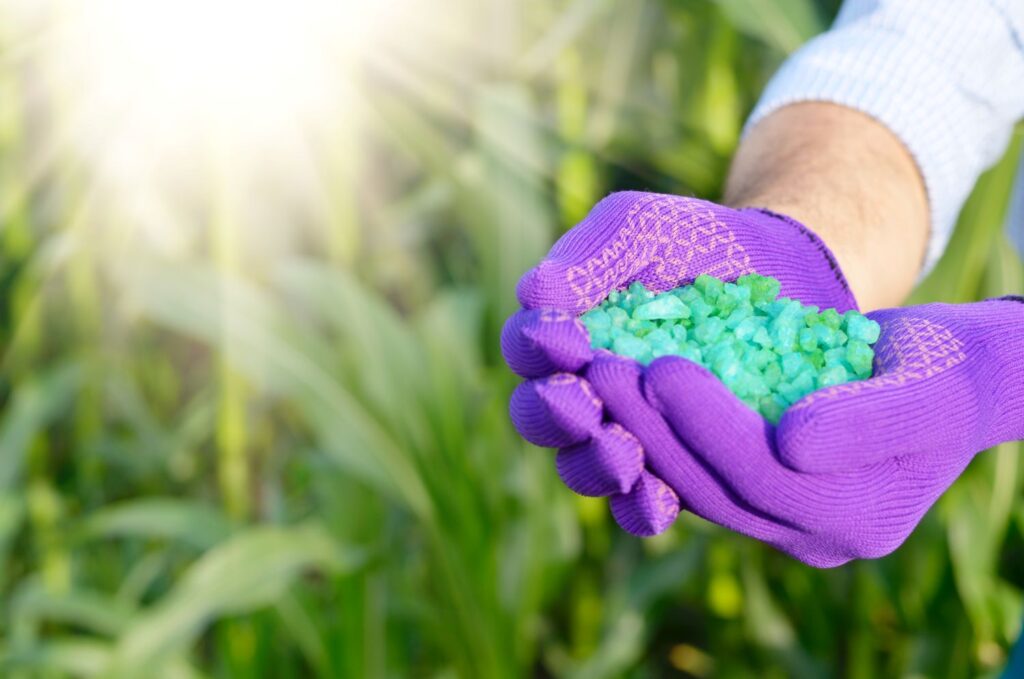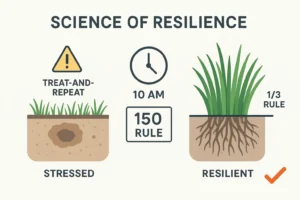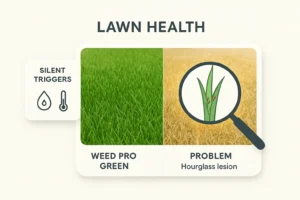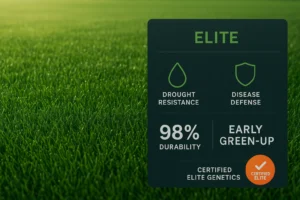We all want that lush, green lawn that makes neighbors do a double-take. And if you’re in Atlanta, where folks take their turf seriously, you’ve probably heard about the benefits of organic lawn fertilizer. It’s eco-conscious, soil-friendly, and perfect for the planet… right?
Well—sometimes.
While organic fertilizers can be a fantastic part of your lawn care toolkit, they’re not a magic potion. In fact, there are some very real nutrient gaps in organic care that might be holding your lawn back. Here at Weed Pro, we’ve seen it all—from green dreams turned patchy to homeowners confused by why their lawn still looks “meh.”
Let’s break down exactly where organic lawn fertilizers fall short, and what you can do to keep your yard thriving in Atlanta’s unpredictable climate.
What Exactly Is Organic Lawn Fertilizer?
Before we get into the juicy stuff, let’s make sure we’re on the same page.
Organic lawn fertilizer refers to any fertilizer made from natural sources—think compost, seaweed extract, chicken manure, or compost tea. These materials feed soil microbes, which in turn release nutrients to your grass.
It’s a slow, steady, soil-loving process. But that slow pace? It’s often where the trouble starts.
Organic Isn’t Always Consistent—Here’s Why
1. Fertilizer Breakdown Time Is Long and Variable
One of the biggest hang-ups with organic options is fertilizer breakdown time. Unlike synthetic fertilizers that provide nutrients almost immediately, organic fertilizers rely on soil microbes to decompose them and make nutrients available.
But guess what affects those microbes?
- Temperature
- Soil moisture
- Soil pH
- Organic matter content
That means your timing for organic feeding is at the mercy of Mother Nature. In cooler months or during droughts, that breakdown process slows way down—leading to turf not greening even after application.
2. Nitrogen Deficiencies Are Common
Let’s talk about nitrogen—the superstar nutrient for green, leafy growth.
Organic fertilizers often contain less nitrogen per pound than their synthetic counterparts. Worse, the nitrogen they do have takes longer to become available. So, unless you apply large amounts (and often), your lawn might suffer from nitrogen deficiencies.
The result? Pale grass, patchy growth, and a lawn that just doesn’t “pop.”
3. Application Rate Confusion Runs Rampant
Reading an organic fertilizer label can feel like decoding a secret message. Should you apply five pounds per 1,000 square feet? Ten? Is that before or after it rains?
Many homeowners don’t apply enough—or apply it too frequently—leading to underfed grass and frustration. It’s easy to see why application rate confusion is one of the top reasons lawns underperform on organic programs.
4. Temperature Sensitivity Is a Hidden Enemy
Atlanta’s weather swings from humid summer scorchers to chilly winters, and those extremes can throw your organic program into chaos.
Most soil microbes thrive between 60 and 80°F. Outside that window? They slow down. That means you might apply fertilizer and wait… and wait… and still see inconsistent results due to temperature sensitivity.
5. Organic Fertilizers Often Lack Micronutrients
Sure, organic fertilizers deliver the basics: nitrogen (N), phosphorus (P), and potassium (K). But what about micronutrients?
Without enough iron, your lawn might struggle with iron uptake delay and develop yellowish hues. Lack of calcium, sulfur, or magnesium can also impact root development and lawn thickness.
Many organic fertilizers skip these elements, leaving you with nutrient gaps you didn’t even know existed.
How to Fill the Gaps in Organic Fertilizer Programs
Tip #1: Test Your Soil First
You can’t fix what you don’t understand. A basic soil test will tell you if you’re low on nitrogen, phosphorus, potassium, or any of the micronutrients your grass craves.
Tip #2: Consider Supplementing with Synthetic Micronutrients
Just because your base is organic doesn’t mean you can’t sneak in a little extra help. Spot-treating with liquid iron or magnesium can green up your lawn fast without disrupting your overall eco-plan.
Tip #3: Don’t Ignore the Calendar
Organic fertilizers need more lead time, especially in spring. Apply early—before soil temperatures drop or rise too high—so your microbes can work their magic on schedule.
Tip #4: Embrace the Hybrid Model
At Weed Pro, we love an organic-synthetic hybrid approach. It lets you enjoy the soil-building benefits of organics while using targeted synthetic applications to correct nutrient deficiencies and push out that stubborn yellowing.
You get the best of both worlds—with fewer headaches and faster results.
Partner With Weed Pro for Smarter Fertilization Plans in Atlanta
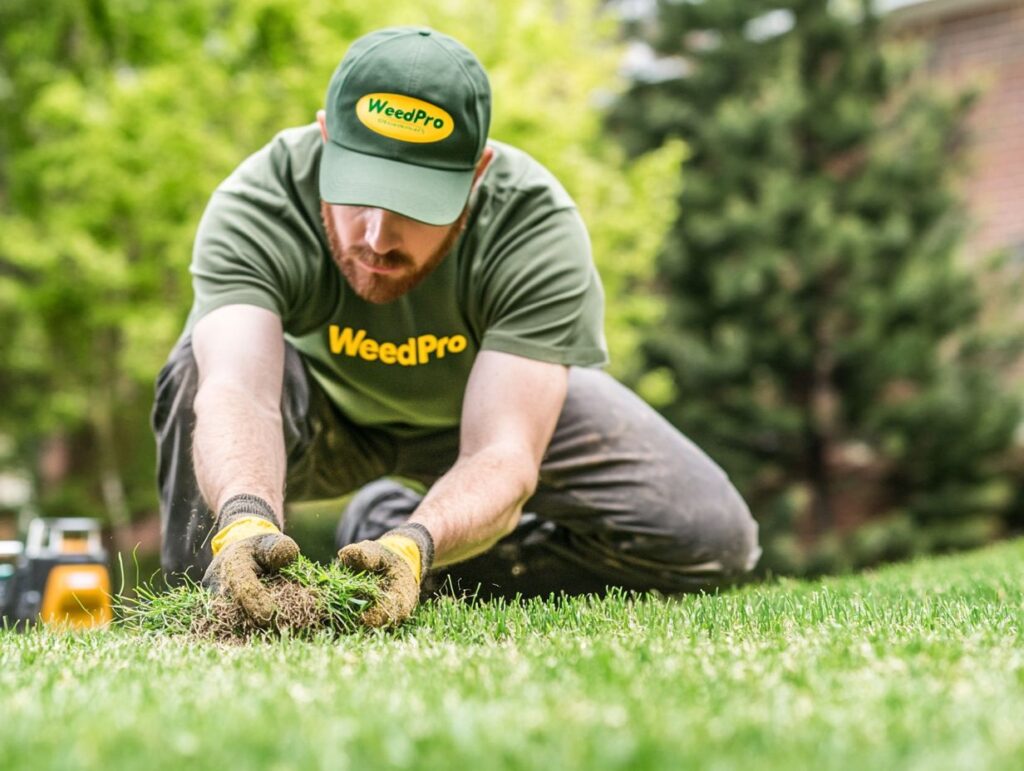
Whether you’re a die-hard organic enthusiast or just trying to figure out why your lawn’s not responding, Weed Pro is here to help.
We don’t do cookie-cutter programs. Instead, we’ll evaluate your soil, understand your goals, and build a custom lawn plan that works for your yard. Organic, synthetic, or a bit of both—we’re all about results and responsibility.
👉 Reach out today for your lawn health checkup, and let’s get your grass back on track!
FAQ: Organic Fertilizers—Beyond the Basics
Can you use organic fertilizers year-round in Atlanta, or should you switch seasonally?
Organic fertilizers can be used year-round, but their effectiveness varies with seasonal temperature changes. In cooler months, soil microbes slow down, which means nutrient breakdown is less reliable. During peak summer heat, excessive application may also stress the turf. Consider adjusting your formula or switching to a hybrid approach during seasonal extremes.
Are there specific grass types that respond better or worse to organic fertilizers?
Yes. Warm-season grasses like Bermuda and Zoysia—common in Atlanta—respond well to organic fertilizers if the program is tailored to their needs. These grasses grow aggressively in summer but may need more nitrogen than organics typically provide. Cool-season grasses may struggle even more with slow-release organics, especially during peak growing periods.
Do organic fertilizers help prevent weeds or just feed the grass?
Organic fertilizers mainly support soil health and grass growth, but they don’t offer direct weed control. A healthy lawn is more weed-resistant, yes—but without pre-emergent or post-emergent treatments, weeds can still take over. If weed prevention is a top concern, additional lawn strategies or products may be necessary.

